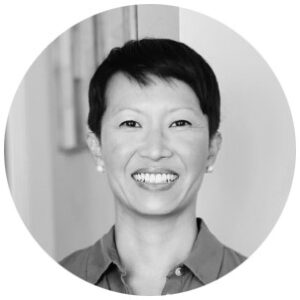ALICE KIM | CONTRIBUTOR
How did your day begin?
If it is anything like mine, it’s filled with good intentions. But just as the day’s momentum begins to build, it’s already 2:30 PM. Soon, the sound of the garage door opening vibrates throughout the home. My daughter’s high-pitched voice greets our golden doodle, and I’m having to answer, “What’s for dinner?” Our good intentions will be just that if it’s not followed up by action.
Some time ago, I came across a short video in which author Malcolm Gladwell said, “… knowing my ending makes the beginning super easy … totally clear what I have to do and totally clear what I shouldn’t do.”
Gladwell was referring to the process of writing and yet, the principle is transferable to moments when I struggle to account for the six hours between the first sip of freshly brewed coffee and the midday scurry of my dog, greeting the family member who has just walked through the mudroom. Or those days when my to-do list is marked by numerous lines striking through them, but feelings of dissatisfaction overshadow any sense of accomplishment. If I know my ending, then it’s clear what I have to do, and clear what I shouldn’t do.
This means I engage each day with the bigger story in sight and have actionable goals that move me toward that end. To help bring clarity when setting goals, here are three questions to consider.
What Will You Do More of? and What Will You Do Differently?
First, what will you do more of in 2024? And second, what will you do differently?
Answering the first question affirms a habit or a practice that’s important and meaningful, that you have already implemented knowing humbly and soberly, that it’s easy to get off track. Perhaps that’s why the New Testament Epistles are littered with exhortations to endure in the faith.
“Therefore, since we are surrounded by so great a cloud of witnesses, let us also lay aside every weight, and sin which clings so closely, and let us run with endurance the race that is set before us…” (Heb. 12:1).
“So we do not lose heart. Though our outer self is wasting away, our inner self is being renewed day by day. For this light momentary affliction is preparing for us an eternal weight of glory beyond all comparison…” (2 Cor. 4:16-17).
And when addressing the second question, be specific while being realistic. Aim for attainable goals rather than aspirations. Otherwise, disappointment and discouragement are likely to steal joy, quench hope, and dampen your motivation to persevere.
For more than a decade of annually renewing the goal to read the Bible in a year, I had to be honest with myself. Though the intention was admirable, by the end of the first week or two in January, I struggled to keep to the reading schedule. And the worst part was, I would stay away from Bible reading because failure was too painful. Denial seemed more bearable. Then after repeated unsuccessful attempts, the goal was simplified: read the Bible daily. If I miss a day or two, or more, I find where I last left off and begin again. It satisfied the greater desire, which is to love God’s Word. That was more important than reading within a specific time frame.
In addition to being specific and realistic, limit yourself to one response per question. Imagine that your goal is a slice of cake. You may crave the whole cake, but regret will overshadow any momentary euphoria, not to mention the upset stomach. If it’s bite sized and you commit to working on it until it sticks and becomes a part of your regular rhythm, then that one change produces significant difference in the long run. Furthermore, if you see creating change as a process and a journey rather than a quick fix to yield instant results, work on one goal at a time. A goal can be challenging and still be within reach.
Why Is This Important to You?
The third question to ask is, why is this important to you?
Making worthwhile changes and persevering at it does not come naturally. Nor is it easy or comfortable; it’s hard, persistent work. But if we do “not grow weary in doing good, for in due season, we will reap, if we do not give up” (Gal. 6:9).
Knowing your “why” becomes especially critical when life becomes overwhelming and hard; when you doubt your motives and stamina for endurance; when the thrill of starting something new has dissipated and you feel the monotony of routine. Reflecting on the “why” refocuses you when you need it the most.
The story is told, in 1962, during President John F. Kennedy’s first visit to NASA, he stopped a janitor carry a broom and asked what he was doing. The janitor answered, “Mr. President, I’m helping put a man on the moon.”
Your “why” puts into perspective that there is more to life than what is immediately visible or what you feel in the moment. The more is not to be confused with the inundated messages of needing more for the sake of having more—more products, more wealth, more fitness, more experiences, more skills, more achievements. Instead, the desire for more is for more goodness, more beauty, more life to pursue on behalf of others, more of the glory of God on this side of heaven.
This past fall, I committed to growing in my understanding of the vicious cycles of poverty and human trafficking. And more, telling the stories of women who took the courageous step into wholeness and freedom and being a voice to the voiceless. What’s motivated me is learning that though my life’s challenges differ from theirs, their stories are my stories. Like me, they too are women longing to be known. Many are moms striving to provide what’s good for their children, wives seeking genuine love in their marriage, and daughters seeking protection and care.
My “why” is fueled by a desire to testify to the hope of the Gospel, that it’s beautiful and believable because it reaches even the darkest of places. And when that day comes when the already-not-yet is no more, I want to join Paul in uttering, “I have fought the good fight, I have finished the race, I have kept the faith” (2 Tim. 4:7). To that end, I set my sight and my goals.
Photo by Alexa Williams on Unsplash

Alice Kim
Alice Kim is a Licensed Clinical Social Worker at Emmaus Counseling and Consulting Services (emmausccs.com) where she offers gospel-centered therapy to the DC Metro area. She finds deep fulfillment in engaging people’s stories and bearing witness to the good work of God to redeem and restore. She is also working toward Certificate Programs in New Testament and Old Testament at Reformed Theological Seminary, DC. She is married to Sam Kim, pastor at Christ Central Presbyterian Church, VA and they raise their two daughters. Her past times include treasure hunting at thrift stores, sharing a cup of coffee with friends, and watching sports with her family.

